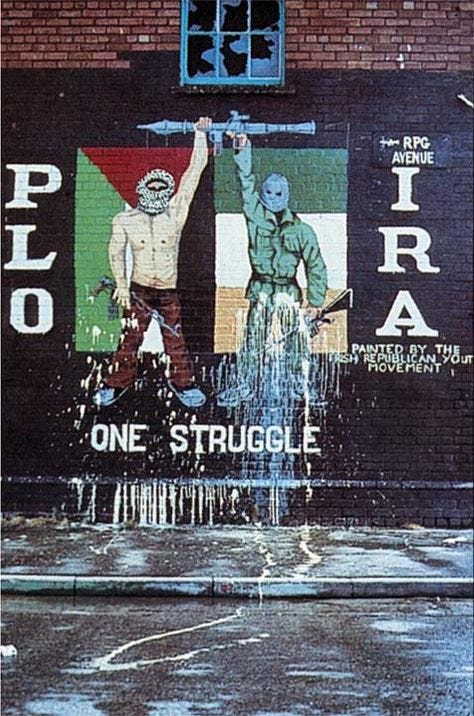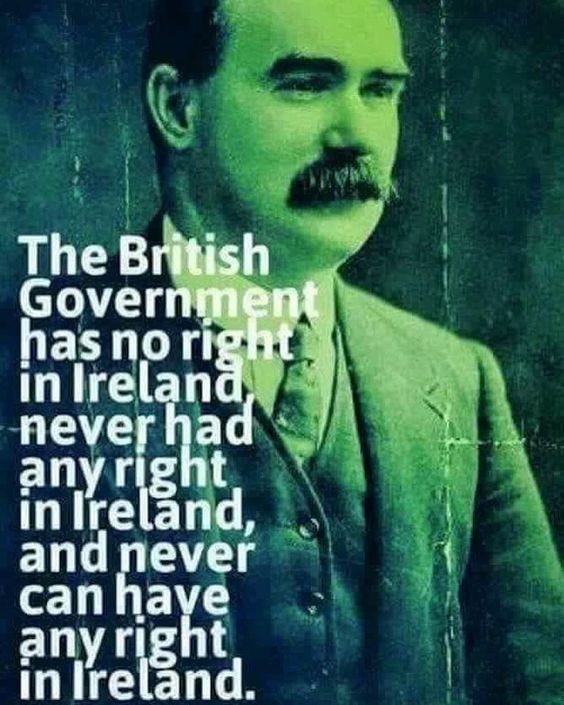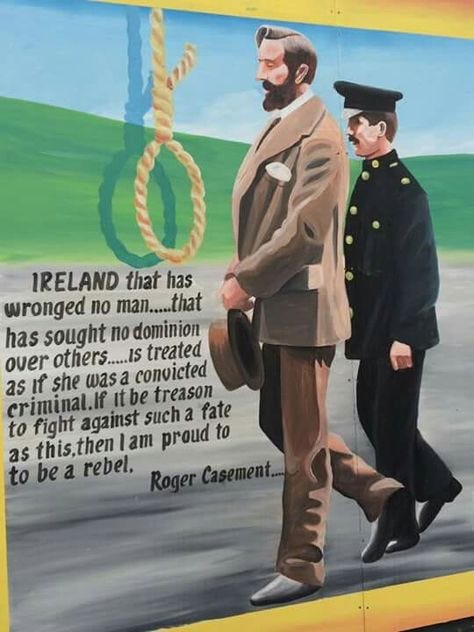The moral imperative of a trumpet
Ireland’s lesson for Ukraine and Palestine: our children will win freedom by a better deed.
A gobshite is a stupid and incompetent person. Pronounced gob-shahyt.
Realpolitik is a 19th century notion conjured by Ludwig von Rochau, which is in widespread use in today’s world. Nowadays it’s taken to mean the politics of pragmatism: achieving the possible, what is realistic, rather than attaching to high-flown, and highfalutin, moralistic goals. Realpolitik contrasts with Idealpolitik.
Rochau’s initial observation, in an endeavour to reconcile the apparent rise of power embedded in nation states and their empires in the 19th century with the liberal enlightenment that had swept across Europe in the 18th century, concluded in the oft-quoted wisdom: “to bring down the walls of Jericho, the Realpolitiker knows the simple pickaxe is more useful than the mightiest trumpet.”
The reference here is to a battle supposed to have taken place when the Israelites were conquering land in what is now the West Bank area of Palestine. It is recounted in the Bible, in the Book of Joshua, and involved the slaughter of every person and every animal in Jericho (at God’s command, mind you), except for the family of a lady of the night named Rahab, who had aided the invasion by hanging a red cord out of her window. The story is dismissed as propagandist legend by archaeologists, who have found no trace of the metropolis that was supposedly thereby conquered (seemingly using the well-known military technique of priests marching around city walls while blowing trumpets). Rochau’s view is that pickaxes would have achieved victory more quickly, but it’s hard to see how that could have been done in less than the seven days it took the trumpeting priests.
Where Rochau errs in this graphic, but facile, comparison is his assumption that trumpets will never bring down city walls. Because, according to biblical legend, they did at Jericho—it is an attested case. Our error would be to assume that pickaxes will bring down city walls at all. For that, there is not a single attested case. So, which of these is Realpolitik: pickaxes, or trumpets?
What the Book of Joshua tells us is a moral story, not an actual story of military history: by stirring up an army to do wondrous things, wondrous things can be achieved. Napoleon Bonaparte once said that the morale of a soldier is worth thrice his weaponry, and that is certainly borne out in tales such as the Battle of Hostomel Airport, which took place in the first days of the Russo-Ukrainian War. A Ukrainian National Guard unit of only 200 soldiers (most of whom had never shot a gun in their lives, and for whom the closest brush with a battlefield had been when playing video games) succeeded in repelling the initial Russian commando attack on the airfield. Shooting down combat helicopters with rifles and a simple rocket launcher instilled courage and determination in the Ukrainians, who were instrumental in saving Kyiv from being taken within the predicted 72 hours.
Twenty-five Ukrainians posted to defend a radar installation at the north end of the airport were, owing to the exposed terrain, unable to flee when outnumbered, and got taken prisoner. They were later exchanged and would report to their debriefers, in a somewhat bemused fashion, that their captors had asked them, “Why did you shoot at us?” The Russians had expected to be greeted as liberators, even though they came in with a sweep of attack aircraft. Russians generally did indeed conclude that Ukraine was to blame for the war: for firing back.
In a mood seen as echoing what all military nations do when honouring their combat dead (and with the propaganda aim of instilling respect for, and devotion to, the nation and its armies, on the part of both the Ukrainian people and foreign onlookers), Ukraine has marked significant days, such as its national day and the day of heroes, in remembrance of its fallen in the still ongoing war, to bolster morale. The conflict has been shrouded from the outset in one big question, which was posed on social media early on by an Arab student at a German university: “What is the nature of the Misunderstanding between these two neighbours?” It was he who capitalised Misunderstanding. But I wonder whether the war will be remembered as that—a misunderstanding. Is war not always the result of a fundamental breakdown of common comprehension—misunderstanding? Or do nations invade other nations because they can?
Since that fateful day in February 2022, many commentators, analysts and news folk have tried to understand. There is speculation as to how it began (NATO, insecurity, theft of assets), and as to the strategies being deployed (tank-resistant defence lines, oil refinery strikes, the Black Sea fleet) and, perhaps most importantly, as to how it will end (victory, of course; but whose?)
In the forefront we have the Idealpolitik notions of Greater Rus, the philosophical right for Ukraine (and, by implication, Estonia, Lithuania …) to exist as a sovereign nation. These are notions of idealism, albeit hardly born of enlightened thinking. As Rochau would discover, the mistake liberals made was to assume that the law of the strong suddenly evaporated simply because it was shown to be unjust. As we have come to learn, nothing could be farther from the truth. Being strong has absolutely nothing to do with morality. But holding to a moral principle can still be an element underpinning strength, albeit of a different kind: the Realpolitiker surrenders when in defeat; the Idealpolitiker fights on to the death, not because he thinks he can win, but because he believes in the ability to win of his children.
Realpolitik is vaunted by those who resort to it as being practical and pragmatic. It sees the world as it is and deals with it in terms of what it is. Idealism, on the other hand, deals with the world in terms of what it ought to be. When idealism attains the upper hand, the Realpolitiker is dismissed as cruel and amoral. The greatest danger, however, lies in assimilating the two views in one, and that is what has happened in Palestine.
Realpolitik has decreed the extermination or elimination by whatever means of the Palestinian people, a process seen as getting nowhere fast for the past 50 years, now accelerated into an end game that nonetheless fulfils an ideal, one backed by as moral a tenet as one can muster: a place of sanctuary and safety for the Jewish people, where, at last, they can find refuge and protection from their enemies around the world. For this they exert pressure on US politics, and enforce moral imperatives against Germany, which has in the past sought to eradicate their race. Whilst the Jewish left pleads for a morally sound solution in a single state that assures the freedoms and rights of all its citizens, as only, in their view, a modern, liberal society surely can, the ultra-orthodox denounce that ideal as unrealistic, and insist on their own ideal: destruction of their fellow man in the name of their own preservation: the ideal of reclaiming the land that Joshua fought for.
What Roger Casement, Padraig Pearce, James Connolly and the other great Irish nationalists wrought for Ireland was a vision inspired by idealism, backed by an achievement that was in truth realised against all the odds, which no one, least of all Michael Collins, could have dreamt would ever be feasible; which in 1910 had only the prospect of absolute and utter failure as its sole, possible outcome: ravaged Ireland taking up arms against the great British empire.
Where Ukraine has drawn its strength from to stand up with valour and dignity against its enemy I cannot tell. I am not the only one: across the world people are baffled at the Ukrainians’ tenacity in the fray of their crisis. If they lose, then the world must do them the honour of casting them as victors all the same, just as we Brits did at Dunkirk. Victors not, to be sure, of Realpolitik, for that would have demanded capitulation on the airfield of Hostomel; but, certainly, victors of Idealpolitik, for their determination to fight to the last for an ideal grounded in self-determination as a universal aspiration. Ukrainian pacificist philosopher Vlad Beliavsky put it thus: You’ve got 40 million united Ukrainians, so what will Putin do? Will he massacre 40 million people? That’s the only way he can win this war. The only way.” That from the mouth of a pacifist. That’s quite some mettle that these Ukrainians possess.
But from where was it that the Irish drew their valour? A large part of it came from something that, outside the Emerald Isle, is rarely talked about these days: the Great Famine, the Gorta Mór. Frequently portrayed as a nation’s battle against an insect-induced harvest failure, it may have had that as its root cause but it had its effects as the result of man’s untrammelled cruelty to his fellow man. Great quantities of foodstuffs were exported from Ireland whilst the laissez-faire government in London looked away uncaringly. Absentee landlords evicted families from the far reaches of the west and south of Ireland, and in some towns two-thirds of the population perished. Over a million fled abroad, mostly to the USA. And at home a million died, and were buried in the very land that could not victual them. The period 1845-1852 was a harsh period of Irish history, made harsher by rich, self-satisfied men. The Famine was not some natural disaster against which no measure was possible. The British occupiers aggravated a crisis to, as a matter of policy, make of it—there is no other word—a Holocaust.




Top left to bottom right:
The Irish Republican Youth Movement declares unity with the Palestine Liberation Organisation.
James Connolly (Scottish trade unionist and Irish republican, 1868-1916): “The British government has no right in Ireland, never had any right in Ireland and can never have any right in Ireland.”
Roger Casement (British diplomat and Irish humanitarian activist, 1864-1916): “Ireland, that has wronged no man, that has sought no dominion over others, is treated as if she was a convicted criminal. If it be treason to fight against such a fate as this, then I am proud to be a rebel.”
Pádraig Pearce (Irish barrister and political activist, 1879-1916): “You cannot conquer Ireland; you cannot extinguish the Irish passion for freedom. If our deed has not been sufficient to win freedom, then our children will win it by a better deed.”
It is the ever-present memory in Irishmen’s minds of this cruel disaster wrought upon them by a wilfully insouciant foreign occupier that is surely influencing the sympathies manifested today by Ireland with Palestine. Ireland has been before where Palestine now is—succumbed by military might, starved to death, encouraged to exit. Ireland has voiced its sympathy, and Palestine must look to Ireland as a source of support, and of morale, and, if need be, of means. It is ironic that the sole other voice in Europe backing the Irish position on Palestine at this time is Spain—a nation infamous for the cruelty it imposed itself on a worldwide empire of its own. Be that as it may, it is to Spain’s credit that it sees justice in an ideal that baulks at all notion of Realpolitik in the Holy Land. I just wonder at how this all sits in the Canaries and Catalonia. Neither we, the weak, nor they, the powerful, may ever forget: the law of the strong will not evaporate simply because it is shown to be unjust.
The resolution to the Ukrainian situation will likely come at the negotiating table and a realpolitical Ukrainian position would be to preserve life and concede principle: to lay down both trumpet and pickaxe, and seek, at least, respite in justice. Some ideal may yet be attainable, but with skill and precision.
What Ireland achieved in 1927 was remarkable. The rebels of 1916 had been executed and, eleven years later, the Free State that would preface the Republic had been wrenched from the occupiers’ hands. It was an idealistic fight by which Hamas might well be buoyed, and in which—one hopes—it might not be constrained to take up further arms. On that we may defer to their opponent: will Israel recognise restraint as weakness, as Realpolitik, or as idealism?
For now, the downtrodden will contemplate what they’ve lost, consider what’s realistic, and fix on such deals, and ideals, as may assure them ... some victory. And then they may reflect: if our deed has not been sufficient to win freedom, then our children will win it by a better deed.





I am not unsympathetic to the Paelestinian people, Graham. But I have no use for the Iranian backed Hamas. Israel posed no threat to Iran, unlike the British to Ireland. Britain conquered Ireland in 1169 and always held the Irish in low esteem - after all they were a Celtic Nation, like the Scots and Welsh, not good purebred Anglo Saxon conquerers like the Anglo Saxon Normans they were (yeah that's right - they were never purebred) [For the record I am 96% Scottish according to my genetic map] After Henry the 8th the Brits had a further argument - those Irish stuck to Roman Catholicism for heaven's sake (of course the Brits used to be Catholics themselves) Apparently it was mostly a matter of principle for the English 'we conquered you dammit, stay conquered'.
In Palestine the situation is not quite the same. Israel is a product of the UN and Great Britain,. (the English or the United Kingdom whatever you want to call it) They are the ones who screwed up,. Since the Europeans were the ones who tortured, punished, and despised the Jews for centuries. [The Diaspora went on for a very long time.] They were correct in their effort to carve out a property in which the Jewish people could carry on their lives and religion in peace and harmony. And since the first we heard of the Jews historically was approximately where Israel stands today. But there were other problems the UN and British overlooked. The Palestinians had been living on that same property for a few centuries - ok, no problem, they were after all a British colony, part of the British empire on which the sun never set.
So Britain arbitrarily agreed to carve Israel out BUT, The British were largely Christian Protestants oops! They wanted certain "holy" places preserved for International worship and pilgrimage, Thus they did not include Jerusalem in Israel despite the fact that biblically Jerusalem had long been the Capitol city of the Jews. The Jewish saying during the pogroms was 'next year in Jerusalem' not 'next year in Israel'. Apparently Muslims as well as Christians held Jerusalem as a shrine. So the Jews accepted the loss of Jerusalem and set their capitol in Tel Aviv.
The other huge mistake, was in thinking the Palestinians - being a third world nation had no dreams of their own BS. They gave them the teensy weensy Gaza strip and what we call the West Bank with hundred of miles dividing the same people. Dumb, stupid, irresponsible.
So, the other Muslim nations vowed to destroy Israel. and several attempted to do so, Egypt, Lebanon, and other Arabic States.
Meanwhile in Iran (formerly part of the great empire of Persia) kicked out the Pahlevi aristocrats and replaced them with theocrats instead - much as the 'pretend communists' did in Russia, they killed the last Czar and his family and ultimately replaced them with Stalin, who instead of declaring himself emperor, made himself dictator for life (he still lived like an aristocrat, as does Putin, but with the public facade of the exalted "worker".
These new theocrats in Iran didn't want to get their own hands dirty, instead they sponsored (financially) and trained a bunch of terrorists to destroy Israel. Hamas and Hezbollah. The Houthi's Iran also sponsors are the pirates who bring in wealth from attacking commercial shipping.
With that background we have the continual ongoing war for Israel from several fronts. Prior to Netanyahu, the Israelis successfully squashed every attack and terrorist activity against them. The US and many European countries helped with financial and weapons support so Israel needed to supply the military.
Netanyahu is basically evil, the way Trump and Putin are. There is nothing good in any of them. The Israelis would be wise to grab Netanyahu now and throw his loathsome body in prison (or summarily execute him - I don't care which) But we, the rest of the world need to make Iran haul in all its terrorists, cease and desist from interfering with the governance or religion of any other nation and stop persecuting women in its own country. Until that is accomplished I see little hope for that entire area.